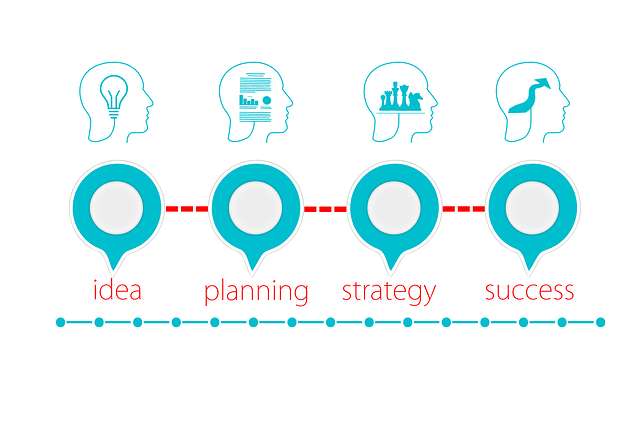Starting a business can be exciting, but it is also a risky venture that you might spend much of your time and effort on — only to eventually make a loss. You’re smart to seek business plan help before going any further.
A business plan identifies what you will be selling, to whom and how, among other issues.
But maybe you’re new to starting a business, and need some business plan help. Don’t worry, because I’ve got you covered! Let’s start with your format options.
Editor's note: Got questions about putting your idea online? Get instant answers on GoDaddy Asia Facebook Messenger now.
Decide on your small business plan format
All business plans start out as an empty sheet of paper (or a blank online document, depending on whether you’re writing or typing your plan). But how your small business plan will eventually look depends on your chosen format for it.
The traditional option
For one, you could go with the traditional business plan format, which extensively fleshes out your business model and strategies over several pages.
This is a good idea if you will be trying to get external funding for your business (whether from family, friends, banks and so on) and need to convince these investors to entrust you with their money.
Short and sweet
Otherwise, you could adopt a leaner business plan format that succinctly provides a general overview of your business. Such business plans tend to be not longer than one page.
But if you’re undecided on which business plan format to adopt, you could do both.
You could start off with a one-page summary of your business plan. Then, as you do market research and further plan your business, you can create a longer, more comprehensive business plan that covers all your ideas and strategies in greater detail.
If you need a small business plan example, check out these templates.
Related: Not sure if your business idea has potential? Read this
Start filling in your small business plan

Once you’ve decided on the format of your business plan, it’s time to start filling it in!
While there is no hard and fast rule on how detailed your business plan should be, your business plan should generally cover at least the six areas below.
1. Summary of your business
What will your business be about? What will you be selling — products, services or both?
From reading this summary, readers should get a good idea of your business, even if they don’t go on to read the rest of the business plan.
As this summary comes at the start of the business plan, you might be inclined to write it first.
Writing the rest of your business plan first helps you consolidate your thoughts on your business, such that you can easily summarise them later on.
2. Products or services

What products or services do you intend to sell as part of your business?
These could be:
- Physical products, such as books or sneakers
- Digital products, such as online courses or eBooks
- Online services, such as freelance writing or virtual assistant help
- Offline services, such as painting lessons or tutoring
Consider also how you are going to sell these products or services.
For example, are you going to set up a website or E-Store? Or will you need to rent a space for conducting your business out of?
3. Target audience
Who will you be selling your products and/or services to?
Knowing your target audience is important, as this can affect the types of products and services you offer, and how you market your offerings.
As an example, perhaps you decide to offer skating classes to children below 12 years old.
If so, you’d need to be prepared to provide children’s skates and equipment instead of gear for adults.
You may also need to engage instructors who are skilled in managing children.
4. Market analysis
Before you declare yourself open for business, you should also know what you are getting yourself into.
Specifically, who are the existing players in the market and what are some market trends that you’ve observed? It can be helpful to do a SWOT analysis, where you identify your startup’s:
- Strengths
- Weaknesses
- Opportunities
- Threats
Doing this will help you get a better understanding of how your business stacks up compared to its competitors, and what you can do to help your business to stand out.
5. Pricing strategies
How much are you going to charge for your products or services?

This can be a tricky question to answer. As a business owner, you need to find the right balance between keeping your prices competitive and maximising your revenue.
For example, if you’re a freelance photographer, it can help to check out the market rates for freelance photography services in your city for guidance on how much to charge for your own services.
Alternatively, you can also consider charging based on the amount of value that customers will get out of your services. This can be harder to calculate, but can reap significant revenue for your business if done right.
6. Marketing strategies
Finally, how are you going to reach out to potential customers?
Before you decide, you should ideally already know your target audience (see point 3 above). Then, think about where they are usually present and approach them there.
As an example, if you are selling baby clothing, you could market your goods in parenting Facebook groups.
Using the right social media strategies, you could just reap lots of business this way!
Investing in email marketing is also a good way of engaging with and publicising upcoming promotions to potential customers.
Use this business plan help to start with confidence
Got your small business plan ready? Great!
It can be tempting to start working on your business right away, but take the time to show your business plan to trusted friends, mentors and advisors.
Based on their past experiences, they may be able to offer valuable feedback and business plan help.
Starting a business isn’t an easy journey. But by creating a small business plan in the right format, and that contains key information on your business model and strategies, you will be taking steps in the right direction to set up your business for success.
Good luck!






